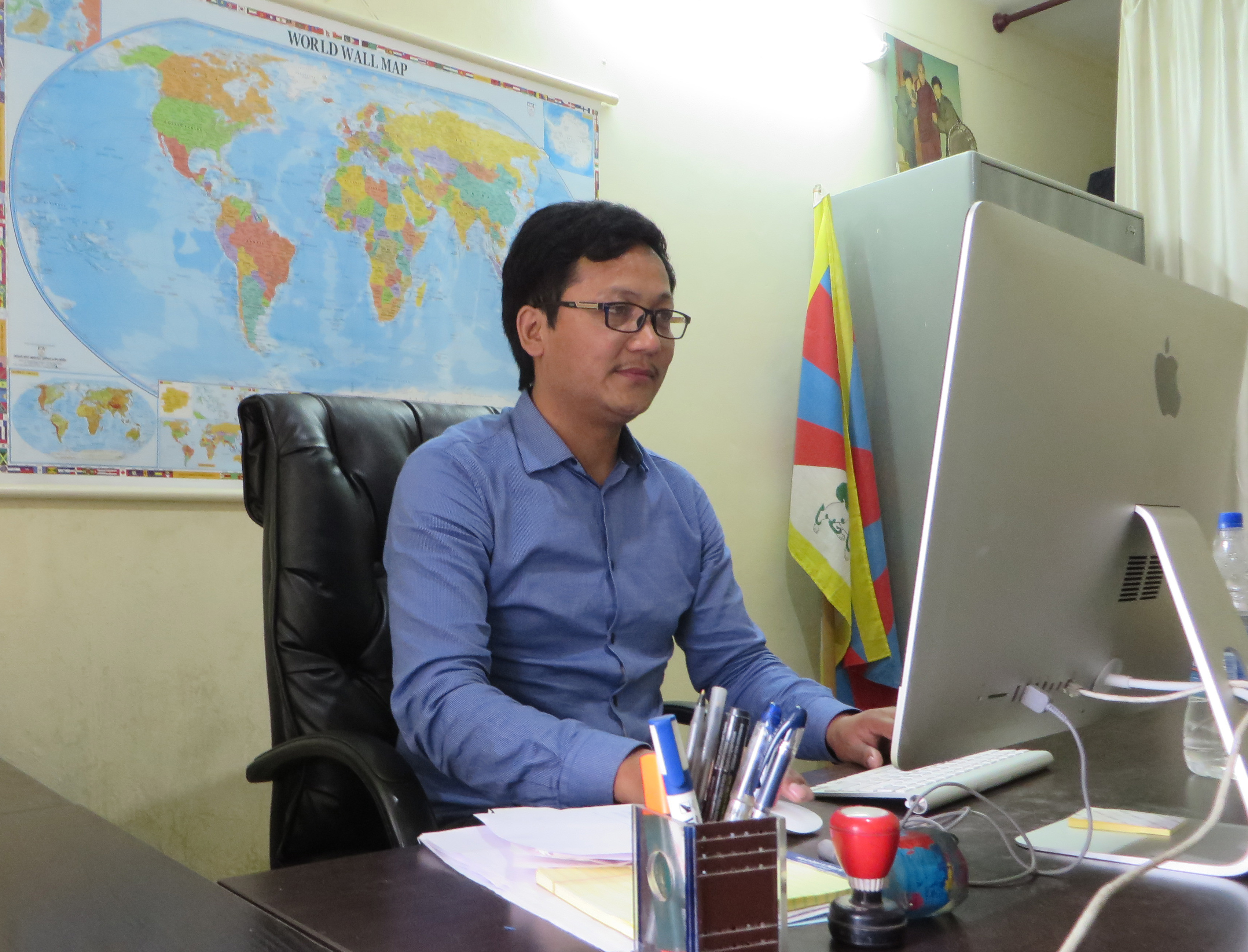Dhondup Tashi has just been elected Chitue (Member of Parliament) for theAmdo region of Tibet. Coupled with his job as Editor-in-Chief of Tibetan newspaper the Tibet Times, his influence is considerable. It is a power with which he intends to realise his life-long dream: contributing to the Tibetan cause.
The journey to his desk at the Tibet Times and his newly-acquired status as an elected politician began with an idyllic childhood high up on the grasslands of Tibet. Born in a small village in Amdo, Dhondup Tashi describes it as a special time, full of freedom and fun and where four households made up his entire world.
There was no school, so almost from birth he began learning to be a shepherd. Each family owned around 50 goats, 100 sheep and50 yaks as well as their beloved horses, and took turns in caring for the animals. From the age of five, every four days Dhondup Tashi was responsible for 200 goats, leading them onto the hillside to graze.
His village was four hours on horseback away from the nearest road and he saw a vehicle for the first time in his life when, aged eight, he gathered excitedly with fellow villagers to look at the small red tractor that had appeared in their midst. They ran away in horror when they heard the machine start.
Despite the absence of vehicles, electricity, telephones and television, DhondupTashi’s childhood was one of plenty and a lack of formal education did not mean that he grew up illiterate. Just as his grandfather taught his father to read, his father taught him, reciting and transcribing Buddhist prayers and igniting in him a great passion for learning.
Theirs was a devout household and every morning and evening the family gathered together to pray. His Holiness the Dalai Lama had a huge influence on him and he remembers the love, respect and faith he inspired among them. Repeating His Holiness’ name – Tenzin Gyatso – transformed him from a myth-like figure to a real man and Dhondup Tashi yearned to meet him, knowing that the only way to do so was to go to India.
When he was 14 he ran away, getting as far as Tibet’s capital, Lhasa, where he lived with someone from his village but never earned enough to continue on his journey to India. After five months his parents arrived and took him home where he stuck out village life for another three years. He was too old for school but knew that nomadic life was not for him, so by threatening to run away again if they did not support him, he persuaded his parents to send him to Labrang Monastery. They understood his drive to get an education and to be able to contribute to the Tibetan cause.
Though he was unable to live and have lessons with the monks, he rented a room and spent three happy years there. He studied Tibetan literature and Buddhism, debating and learning with the monks and managing to resist the distractions of city life. He relished the opportunity to to learn from intellectuals and renowned scholars.
Together he and his friends wrote essays criticising the Chinese government, so when one day the police burst into his room, he was not altogether surprised. They found one of His Holiness the Dalai Lama’s books, as well as evidence that Dhondup Tashi had been writing to family members outside Tibet and he was arrested and interrogated for three weeks. Subsequently, he had to report to the police every month, his hatred for the Chinese increasing with every visit.
After Labrang, Dhondup Tashi went to university but because his education to date had been somewhat unconventional, he had no certificates and so did not qualify for a free education, a loan or student accommodation. Once again therefore, he rented a room and, supported by his parents, paid for everything himself.
Finally, in 2002, at the age of 22 Dhondup Tashi made it to India. The journey was not easy. While travelling through the Himalayas he was caught by Chinese officials spent a month in prison. With no passport, papers, or identification of any kind they did not know where he came from and could not send him home. Despite repeated beatings, he never strayed from his tale. He was a vagabond, he claimed insistently, a pilgrim with no home and nowhere to go.
When he reached Nepal he suffered the same treatment, spending another two weeks in prison.
DhondupTashi’s dream of making it to India was one he had harboured since he was a young child, but once there he soon learnt that his difficulties were not over. The heat, the noise, the food; everything was worlds away from anything he had ever experienced. He had left a comfortable life for one full of uncertainties. He knows he is lucky to have had life choices. He is now settled in India, bringing up children of his own and his parents are proud of him. His village in Tibet is flourishing, and though he misses its beauty and wide open spaces, here he has intellectual freedom, a political career and above all the opportunity to fight for his country.





 Print
Print Email
Email













